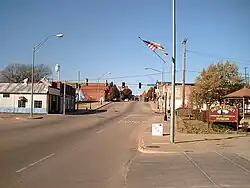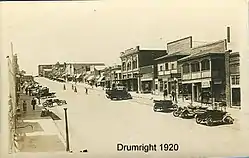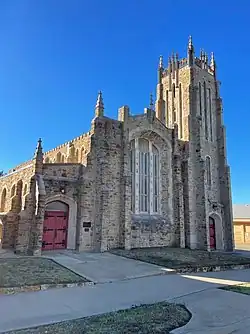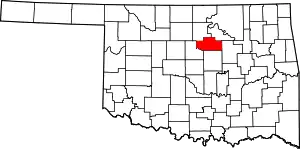Drumright, Oklahoma | |
|---|---|
 Downtown Drumright (2010) | |
| Motto: "Oklahoma's Boomtown" | |
 Location within Creek County and Oklahoma | |
| Coordinates: 35°59′26″N 96°35′52″W / 35.99056°N 96.59778°W | |
| Country | United States |
| State | Oklahoma |
| Counties | Creek, Payne |
| Area | |
| • Total | 7.39 sq mi (19.15 km2) |
| • Land | 7.39 sq mi (19.14 km2) |
| • Water | 0.00 sq mi (0.01 km2) |
| Elevation | 791 ft (241 m) |
| Population (2020) | |
| • Total | 2,560 |
| • Density | 346.46/sq mi (133.77/km2) |
| Time zone | UTC-6 (Central (CST)) |
| • Summer (DST) | UTC-5 (CDT) |
| ZIP code | 74030 |
| Area code(s) | 539/918 |
| FIPS code | 40-21750 [3] |
| GNIS feature ID | 2410360[2] |
| Website | cityofdrumright.com |
Drumright is a city in Creek and Payne counties in the U.S. state of Oklahoma. It began as an oil boom town. However, the population has declined as oil production has waned in the area. The population was 2,907 at the 2010 census, a figure almost unchanged from 2,905 in 2000.[4] Drumright and nearby Cushing were at the center of the large, productive Cushing-Drumright Oil Field in the 1910s and 1920s. Now Drumright is home to a festival called The Drumright Monthly Market, where hundreds of visitors come on the first Saturday of every month, seeking crafts and delicacies from all over the region.
History

The town sprang up nearly overnight in 1912, after wildcatter Tom Slick struck oil on the farm of Frank Wheeler, causing a rush of speculators, oilfield workers, and merchants into the area. A post office was established in the community on December 28, 1912. Local landowners James W. Fulkerson and Aaron Drumright platted a townsite, which was initially called Fulkerson, The town was renamed for Aaron Drumright, a farmer and later local businessman whose farm was part of the townsite.[5]
Oil workers flooded into town so quickly that they lived in tents or shacks made from box cars, causing the community to be known locally as "Ragtown." Hotels and boarding houses were constructed next, as well as amenities like gambling dens, dance halls, and roadhouses, where the workers could spend their money. Drumright incorporated as a town on May 27, 1913. In 1914, the city built a two-story building of stone to serve as an elementary and high school. It was called Washington School, and is listed on the National Register of Historic Places (NRIS 81000462). Two banks opened in the town during 1914. Drumright was designated a first-class city after an election on April 18, 1916. The 1920 census reported a population of 6,460.[5]
The Oil Fields and Santa Fe Railway, an Atchison, Topeka & Santa Fe Railroad (AT&SF) subsidiary, built a track from Frey Junction (south of Oilton) to Drumright in 1915.[6] The following year, the AT&SF built a line north from Shamrock to Drumright. The Oil Fields and Santa Fe Railway was merged into the AT&SF in 1941.[7]
In 1919 a riot broke out in Drumright during a strike by telephone workers. The town's mayor and chief of police were locked in the town jail by rioters. The Governor of Oklahoma sent six militia units to town to restore order.
Drumright hosted minor league baseball. The Drumright Oilers teams played as members of the Class D level Western Association and Oklahoma State League between 1920 and 1923.[8][9] In the fall of 1922, Babe Ruth and his New York Yankees teammate Bob Meusel played in an exhibition game in Drumright while on a barnstorming tour.[10]
Beginning with the Depression of the 1930s, the town declined as oil production waned, and a large refinery at the edge of town closed in the 1950s.
Tornadoes have caused loss of life and property damage in Drumright on at least two occasions: on April 2, 1956, when five people were killed and several homes, a school, and the public library were damaged; and on June 8, 1974, when 12 people were killed, a nursing home was destroyed, and about 100 homes were damaged or destroyed.[5]
Geography
Drumright is located in western Creek County. A small portion of the city extends west into Payne County. Drumright is 26 miles (42 km) west of Sapulpa, 42 miles southwest of Tulsa and 76 miles northeast of Oklahoma City at the junction of State Highways 16, 33 and 99.[5] According to the United States Census Bureau, the city has a total area of 7.5 square miles (19.5 km2), of which 0.02 square miles (0.04 km2), or 0.19%, is water.[11]
Demographics
| Census | Pop. | Note | %± |
|---|---|---|---|
| 1920 | 6,460 | — | |
| 1930 | 4,972 | −23.0% | |
| 1940 | 4,303 | −13.5% | |
| 1950 | 5,028 | 16.8% | |
| 1960 | 4,029 | −19.9% | |
| 1970 | 2,740 | −32.0% | |
| 1980 | 3,278 | 19.6% | |
| 1990 | 2,799 | −14.6% | |
| 2000 | 2,905 | 3.8% | |
| 2010 | 2,907 | 0.1% | |
| 2020 | 2,560 | −11.9% | |
| U.S. Decennial Census | |||
As of the census[3] of 2000, there were 2,905 people, 1,209 households, and 790 families residing in the city. The population density was 411.8 inhabitants per square mile (159.0/km2). There were 1,378 housing units at an average density of 195.4 per square mile (75.4/km2). The racial makeup of the city was 84.44% White, 0.93% African American, 8.47% Native American, 0.03% Asian, 0.17% from other races, and 5.96% from two or more races. Hispanic or Latino of any race were 0.90% of the population.
There were 1,209 households, out of which 29.9% had children under the age of 18 living with them, 47.5% were married couples living together, 14.2% had a female householder with no husband present, and 34.6% were non-families. 31.0% of all households were made up of individuals, and 16.5% had someone living alone who was 65 years of age or older. The average household size was 2.34 and the average family size was 2.92.
In the city, the population was spread out, with 25.5% under the age of 18, 8.0% from 18 to 24, 25.2% from 25 to 44, 20.3% from 45 to 64, and 20.9% who were 65 years of age or older. The median age was 38 years. For every 100 females, there were 87.5 males. For every 100 females age 18 and over, there were 81.2 males.
The median income for a household in the city was $27,292, and the median income for a family was $34,761. Males had a median income of $30,069 versus $20,123 for females. The per capita income for the city was $14,511. About 13.7% of families and 17.3% of the population were below the poverty line, including 19.7% of those under age 18 and 11.0% of those age 65 or over.
Government
Drumright has a council-manager form of government.[5] The current Mayor is Deborah Guillot Bright. The Vice Mayor is Jeremy Snow. The other city commissioners are Derrek Beaumont, Tabitha Snell and Misty Cook. The City Manager is Mark Whinnery, the City Clerk is Shawna Jackson and the City Attorney is Andrew Nestor, III.
Economy
Today, oil, gas, education, medicine and agriculture are the largest local industries. Drumright is home to an area vocational and technical school, Central Technology Center, which opened August 22, 1970, and employs about 125 people.[5] Drumright is also home to the Drumright Regional Hospital. A tourist attraction is the Tidewater Winery that opened in a historic building that once served as a school for the children of refinery workers.[5]
Transportation
Drumright is at the eastern intersection of State Highway 33 (east-west) and State Highway 99 (north-south). It is also the western terminus of State Highway 16 (also east–west, but further to the south of SH-33).[12]
The nearest airfield is Cushing Municipal Airport, about 12 miles west-southwest.[13] The nearest commercial field is Tulsa International Airport,[14] about 50 miles east-northeast.[15]
Education
Drumright School District includes approximately 500 students in two school buildings. Bradley Elementary serves Pre-K, Kindergarten, and 1st through 5th. Cooper Middle School serves 6th through 8th, while in another part of the same building, Drumright High School serves 9th through 12th.[16]
Central Tech, the marketing name for the Central Technology Center, previously Central Vo-Tech,[17] is an affiliate of Oklahoma CareerTech, the state’s system of career and technology education.[18] Central Tech offers full-time and short-term classes in a large variety of fields.[19]
Parks and attractions
The Drumright Monthly Market, where hundreds of visitors come, seeking crafts and delicacies from all over the region. First Saturday of every month April through December.
Drumright buildings sport multiple murals, including the Oil Patch Collage Mural on the Sugar Plum Antiques Building, the American Flag Mural on the Drumright Fire Department Building, the Way Park Mural on the Boomtown Theatre Building, and the Drumright Street Scene of 1920 Mural on the Citizen's Insurance Agency Building.[20] Additional murals are inside the Drumright Historical Museum.[21]
The Drumright Historical Museum is housed in a 1915 Santa Fe Depot which is on the National Register of Historic Places, and has old railroad cars, but focuses on the unique history of the first great oil discovery in Oklahoma in 1912, leading to the Drumright Field producing more oil than any other in the world by 1917.[21]
Whitlock Park features a splashpad, skateboard park, a stage for special events, pavilions, a playground for young kids, and walking paths.[22]
Way Park features a gazebo for musical performances.[23]
Judy Shelton Burris Park has a Dog Park and a basketball court.
Garrett Park in Country Club Heights has a basketball court.

The following sites are NRHP-listed:
- Jackson Barnett No. 11 Oil Well
- Wheeler No. 1 Oil Well
- Drumright Gasoline Plant No. 2
- First United Methodist Church of Drumright
- Aaron Drumright House
- J.W. Fulkerson House
- Santa Fe Depot (now the Drumright Historical Museum)
- Tidal School
- Washington School
See also
References
- ↑ "ArcGIS REST Services Directory". United States Census Bureau. Retrieved September 20, 2022.
- 1 2 U.S. Geological Survey Geographic Names Information System: Drumright, Oklahoma
- 1 2 "U.S. Census website". United States Census Bureau. Retrieved January 31, 2008.
- ↑ CensusViewer: Population of the City of Drumright, Oklahoma
- 1 2 3 4 5 6 7 Linda D. Wilson, "Drumright," Encyclopedia of Oklahoma History and Culture. Accessed June 1, 2015.
- ↑ "Oil Fields and Santa Fe Railway Company, Cushing Traction Company, and Oil Belt Terminal Railway Company". Railroads of Oklahoma, June 6, 1870-April 1, 1978, pp. 35-39 (accessed of Oklahoma Digital Prairie). Retrieved July 26, 2022.
- ↑ "Atchison, Topeka & Santa Fe Railway Company Merger". 1942. Retrieved July 26, 2022.
- ↑ "Drumright, Oklahoma Encyclopedia".
- ↑ The Encyclopedia of Minor League Baseball. Lloyd Johnson & Miles Wolff, editors (Third ed.). Baseball America. 2007. ISBN 978-1932391176.
{{cite book}}: CS1 maint: others (link) - ↑ "Baseball subject of author talk June 17 - Greene County News Online".
- ↑ "Geographic Identifiers: 2010 Demographic Profile Data (G001): Drumright city, Oklahoma". U.S. Census Bureau, American Factfinder. Archived from the original on March 9, 2015. Retrieved March 6, 2015.
- ↑ "Drumright, Oklahoma". Google Maps. Retrieved June 3, 2020.
- ↑ "Cushing Municipal Airport to Drumright, Oklahoma". Google Maps. Retrieved December 28, 2020.
- ↑ "Nearest major airport to Drumright, Oklahoma". travelmath.com. Retrieved December 28, 2020.
- ↑ "Tulsa International Airport to Drumright, Oklahoma". Google Maps. Retrieved December 28, 2020.
- ↑ "About Our District". Drumright Public Schools. Retrieved December 28, 2020.
- ↑ "Central Tech History". Central Tech. Retrieved December 28, 2020.
- ↑ "About Oklahoma CareerTech". Oklahoma CareerTech. Retrieved December 28, 2020.
- ↑ "We Are Central Tech". Central Tech. Retrieved December 28, 2020.
- ↑ "Search Results (Drumright, Arts and Culture)". TravelOK.com. Retrieved June 1, 2020.
- 1 2 "Drumright Historical Museum". TravelOK.com. Retrieved June 1, 2020.
- ↑ "Whitlock Park". TripAdvisor. Retrieved June 3, 2020.
- ↑ "Way Park". Facebook. Retrieved June 3, 2020.
External links
- City of Drumright official website
- Encyclopedia of Oklahoma History and Culture - Drumright
- City of Drumright Facebook Page: https://www.facebook.com/CityOfDrumright/

